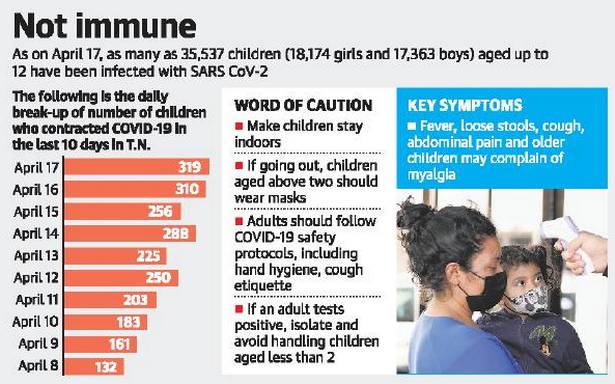Over 2,000 children aged 0 to 12 years have tested positive in the last 10 days; rapid surge in family clusters
Over the past few weeks, the number of children testing positive for COVID-19 has steadily increased in the State.
Though children getting infected is not uncommon given the rapid surge in cases and family clusters, paediatricians have a word of caution for parents as seeking early medical help for symptoms is crucial.
Over 2,000 children aged 0 to 12 years have tested positive for COVID-19 in the last 10 days. On April 17 alone, 319 children were infected, while 310 tested positive on April 16. Till date, children aged 0 to 12 years accounted for 3.6% of the total cases — of the total 9,80,728 COVID-19 cases, 35,537 fell in this age group.
Keeping children safe should be a priority. Of equal importance was seeking medical help early in case of symptoms, say doctors.
The Institute of Child Health (ICH) and Hospital for Children has 11 children in admission for COVID-19. “We had created a separate COVID-19 block and are admitting children who are symptomatic.
Those who are asymptomatic are sent for home isolation and are followed-up,” said S. Ezhilarasi, the institute’s director.
S. Srinivasan, State nodal officer – Child Health, added that children, who came to the ICH, presented with mild illness or were asymptomatic. “We have not seen children with moderate or severe COVID-19. Some children who were tested before undergoing treatment for leukemia or prior to surgery were found to be infected and were admitted,” he said.
Janani Sankar, senior consultant, Kanchi Kamakoti CHILDS Trust Hospital, said as lots of families were testing positive, the children too were infected. “Apart from respiratory symptoms, gastrointestinal symptoms such as loose stools and abdominal pain are more common in children. We will also see cases of multisystem inflammatory syndrome in the coming months, the symptoms of which include high grade continuous fever for four to five days with or without a rash, poor activity and lethargy,” she said.
Last year, most of the children, who were infected with COVID-19, were not sick nor had acute respiratory issues, Ebor Jacob, professor, Paediatric Critical Care, Christian Medical College, Vellore, pointed out.
“In the first wave, we saw no children with acute respiratory complications. Later, as the peak started to come down, we received children with multisystem inflammatory syndrome. We saw 22 children with the syndrome ,” he said.
Dr. Jacob added: “Colleagues in Delhi and Mumbai are now seeing children with high grade fever and respiratory issues than in the first wave. We are yet to see such issues in children here.”
He stressed on the need to keep children safe.
“Last year, children remained at home due to the lockdown. But now, they are moving around freely and are playing outside. We need to emphasise the importance of wearing masks to children. It is important to come to a healthcare facility early if they have fever or any respiratory difficulty,” he said.
As cases continue to surge, it was better that children stayed indoors for the next two weeks and adults should ensure that all COVID-19 safety protocols were followed. If they go out, masks were compulsory for children aged more than two years. If adults tested positive, they should avoid handling children less than two years, Dr. Janani Sankar added.
Dr. Srinivasan noted that COVID-19 appropriate behaviour had reduced at households.
“As a result, we are now seeing an entire family getting infected. Last year, if one person in a house was infected, timely medical care and isolation protected others from getting infected. I think people are relaxed now. Household discipline is needed to keep the infection away from children,” he said.
Source: Read Full Article

